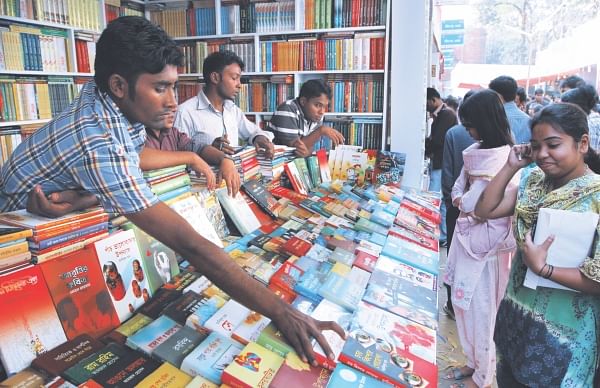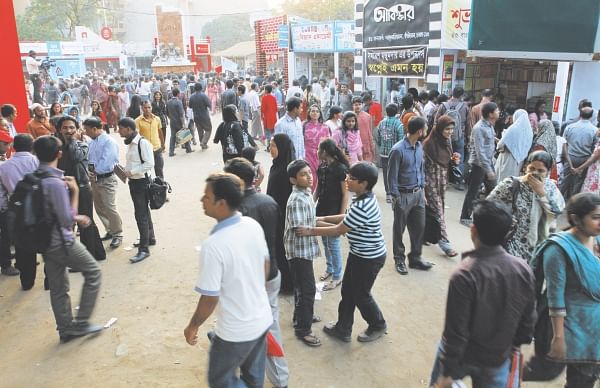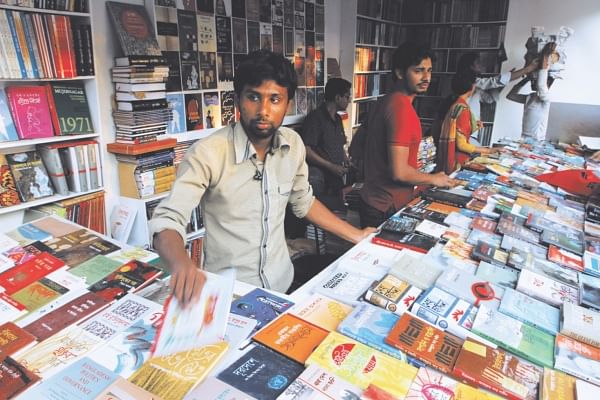| Home - Back Issues - The Team - Contact Us |
 |
| Volume 11 |Issue 09| March 02, 2012 | |
|
|
Special Feature Book Fair Brouhaha Akram Hosen Mamun
The sea of avid readers and apparently countless stalls of publishers and other organisations turned this year's Boi Mela into an event unlike any other. With rows of crowd standing at the book stalls, the air in Bangla Academy premises became thick with an almost opaque wave of dust in the pleasant wintry evenings. People complained that they could hardly stand still as swarms of visitors jostled through the aisles of stalls. But the readers and publishers are, generally speaking, still in high spirits after the fair. In this year's Amar Ekushey Grontho Mela, besides publishing houses, there was a wide range of stalls representing different organisations: governmental, non-governmental, socio-cultural, political, voluntary and even mass media. As a logical consequence of this, the book fair had been somewhat over-crowded from the very beginning. Most of the publishers complained about the stalls of other organisations in the fair. Osman Gani, Publisher and CEO of Agamee Prakashani, thinks that the fair should have been exclusive for publishers only. “The whole space was crammed with too many stalls. I'm not sure if all the people who got to set up a stall in the fair deserved to be there in the first place. There were so many of them that people could hardly move down the aisles,” he says. Commenting on the burgeoning crowd, Professor Niaz Zaman of writers.ink says, “It is impossible to find the desired books in such a crowded place.” She also points out Bangla Academy's inadequacies in organising the fair. “The Bangla Academy keeps saying that it will maintain international standards. But I don't understand why organisations like the British Council and Bashundhara paper had stalls in the books fair. Political organisations also had stalls in there. It harms the integrity of the fair,” she says.
AKM Tariqul Islam Roni of Tamralipi publications and Osman Gani are also of the opinion that the stalls of different socio-political organisations harm the environment of the book fair. “I think the book fair is losing its integrity. We want this fair to be exclusive for publishers only. The stalls of business and other organisations are taking the fair to a different direction” says Roni. The participation of publishers and various organisations at the fair has increased over the years. The variety of stalls representing different organisations with different agendas does not harm the environment of the fair per se. Rather, most of the publishers point out that accommodating too many stalls in the limited space leaves little room for visitors. On a different note, Professor Niaz Zaman complains that the frequent unveiling of books at Nazrul Mancha remains largely unnoticed. “It has become a farce. It's nothing but a photo op. They keep unveiling books without even caring if people are paying the slightest attention to them,” she says. The fair is important in more ways than one. Cultural programmes and lectures take place throughout the month. But Zaman observes that it seemed impossible to get a schedule of these programmes in advance. Anisul Haque evaluates the fair in a completely different light. He agrees that the visitors could not walk down the aisles of stalls with ease. But he also compliments the organisers. “I've been a regular visitor of the book fair since 1985. The population of Dhaka is increasing and so is the number of educated people. But space for the book fair has been reduced, because the space on the other side of the pond is occupied by a building now,” he says. Considering all of this, Haque thinks that the organisers did a praiseworthy job. “The planning was great. There was no accident; no one got trampled during the weekends or on 21st February,” he asserts.
Renowned writer Hasnat Abdul Hye says that the annual Boi Mela is a great encouragement for writers. He says, “More publishers are coming every year. More people are attending.” He is, however, aware of the flipside: “The place became so over-crowded with visitors that people could hardly move in the Bangla Academy premises. So I think the fair should be shifted either to Suhrawardi Uddyan or to the fields of the university.” Ideally, the book fair is supposed to be exclusive for readers, writers and publishers only. But the reality is that the authorities used to let different organisations, including political ones to set up stalls in the fair. However, many of the publishers and writers are satisfied with the general demand for books among the public. “The sales had gone beyond our expectations,” says Roni. Some of the top books sold have been published from his house. In a similar vein, Haque notes, “In many stalls, the sale of books was better than last year. People came here to buy books, not just to hang around.” An overwhelming majority of the visitors were young people. Most of them are college or university students. Publishers keep them in mind as they bring out new books. Roni informs that the majority of books published from his house are on mathematics, science, computer, science-fiction and adventure. “Zafar Iqbal's science-fiction is the most popular among young readers now. Fortunately, we were able to publish two of his sci-fi books for this fair. They were also the best sellers in the book fair.” The fair is a huge cultural event. Publishers as well as readers eagerly await it. Agamee Prakashani published 54 books for the fair. “We have published 10 books by popular writer Hasnat Abdul Hye: nine novels and a collection of short stories. His novel Laraku Patua tells the story of the life and works of Kamrul Hasan. Many previously unknown facts about the great artist's life and the stories behind some of his greatest works have been told in this book,” says Gani. “Back in those days it was really hard to get models to pose for artists. The readers will get to know how Kamrul found his models,” he says. Taslima Nasrin's autobiographical work titled Nirbashan and a collection of her poems titled Shreshtho Kabita, published from Agamee Prakashani were also among the best sellers in the fair. Rushnan Farah, a student of business, says that she lost her husband several times in the swarm of visitors. But she was rather delighted to be there. “With the presence of emerging and seasoned poets, writers, litterateurs, intellectuals and cultural personalities, the fair has become a hub where I can meet people who inspire me,” she says. Setu, a young businessman, says that he went to the fair to buy some popular novels by Humayun Ahmed. “I don't like the films of dust in the wintry evenings. But I'm too fond of Humayun Ahmed's books to give up this opportunity.” Publishing house writers.ink set up a stall in the book fair for the first time this year. “Since we publish English books, I don't expect readers to go crazy about our books. However, the response I got in the book fair was satisfactory. I'm not disappointed,” says Professor Zaman. On the outskirts of Boi Mela, there were massive piles of books with flashy covers on the pavements. An impressive array of popular foreign/Indian writers' books could be found there. Bangla translations of world masterpieces, books on various strands of Islam, and more could also be found there. People also gathered around makeshift food stalls selling chatpati, phuchka and a whole lot of other street food. Finally, in response to the complaints made by publishers and readers, Bangla Academy has decided that from next year, the fair will be exclusive for publishers only. No stalls will be rented to other organisations. Most importantly, it will be confined to the Academy premises. Rows of stalls won't be spilling onto the street anymore. Everybody hopes that this decision, if implemented, will significantly reduce the number of stalls and leave some open space for the crowds. Copyright
(R) thedailystar.net 2012 |


